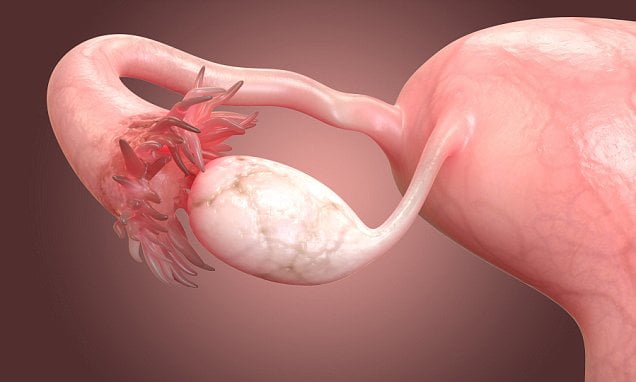As we venture deeper into the 21st century, medical science continues to unveil groundbreaking treatments that challenge our traditional understanding of health and aging. One such area of exploration is ovarian rejuvenation, a topic that ignites hope for many women who have transitioned through menopause. So, in this blog, we delve into the intricate world of ovarian rejuvenation after menopause, examining its potential, and the tips available to help.
Contents
How Can I Rejuvenate My Ovaries After Menopause?
 Ovarian rejuvenation after menopause is an emerging area in medical science, focusing on restoring ovarian function, and potentially enabling fertility and hormonal balance. However, it’s important to note that this field is still largely experimental and not widely practiced. Here are some methods:
Ovarian rejuvenation after menopause is an emerging area in medical science, focusing on restoring ovarian function, and potentially enabling fertility and hormonal balance. However, it’s important to note that this field is still largely experimental and not widely practiced. Here are some methods:
Hormone Replacement Therapy (HRT)
Hormone Replacement Therapy is a well-established treatment primarily used to alleviate symptoms associated with menopause. This works by supplementing the body with estrogen and sometimes progesterone, hormones that decline naturally during menopause. While HRT does not directly rejuvenate the ovaries or restore their natural egg-producing function, it can significantly improve the quality of life for post-menopausal women by balancing hormone levels. There are various forms of HRT, including pills, patches, gels, and creams.
Platelet-Rich Plasma (PRP) Therapy
PRP therapy is an innovative approach that involves injecting a concentration of platelets from the patient’s blood into the ovarian tissue. Platelets are known for their role in healing and regeneration, as they release growth factors that can stimulate cellular repair and renewal. The theory behind PRP therapy in ovarian rejuvenation is that these growth factors might stimulate dormant follicles or improve ovarian function. This therapy has gained attention in recent years, especially in the field of reproductive medicine. However, it remains largely experimental, and more research is needed.
Stem Cell Therapy
Stem cell therapy represents a cutting-edge approach in the field of regenerative medicine. It involves using stem cells, which have the potential to develop into different types of cells, to regenerate or repair diseased tissues and organs. In the context of ovarian rejuvenation, stem cells could theoretically be used to regenerate ovarian tissue and restore its function, potentially even leading to the production of new eggs. This approach is still in the experimental stage, and while initial studies have shown some promise, there are significant technical and ethical challenges that need to be addressed.
Ovarian Tissue Transplantation
Ovarian tissue transplantation is a procedure that involves transplanting ovarian tissue either from the woman herself, taken at a younger age, or from a donor, into a post-menopausal woman. The goal is to restore natural hormone production and potentially fertility. This technique has been used successfully in women who had their ovarian tissue frozen before undergoing treatments that could damage their ovaries, such as chemotherapy.
In Vitro Activation (IVA)
In Vitro Activation is a novel technique that aims to stimulate the growth of dormant follicles in the ovaries. The process involves removing ovarian tissue, treating it in a lab to activate the follicles, and then re-implanting the tissue back into the woman’s body. The treatment is primarily aimed at women who have a condition called primary ovarian insufficiency or those who are facing early menopause, but it has potential applications for post-menopausal women as well. IVA is still largely in the research phase.
Medications and Supplements
 Various medications and supplements are often recommended to ease the symptoms of menopause, though their role in actually rejuvenating the ovaries is limited or unclear. For instance, non-hormonal medications like selective serotonin reuptake inhibitors (SSRIs) can be used to manage mood swings and hot flashes. Supplements such as black cohosh, red clover, and evening primrose oil are popular among women seeking natural remedies. However, their effectiveness varies, and they are not universally endorsed by the medical community. Calcium and vitamin D supplements are important for bone health post-menopause.
Various medications and supplements are often recommended to ease the symptoms of menopause, though their role in actually rejuvenating the ovaries is limited or unclear. For instance, non-hormonal medications like selective serotonin reuptake inhibitors (SSRIs) can be used to manage mood swings and hot flashes. Supplements such as black cohosh, red clover, and evening primrose oil are popular among women seeking natural remedies. However, their effectiveness varies, and they are not universally endorsed by the medical community. Calcium and vitamin D supplements are important for bone health post-menopause.
Genetic and Molecular Therapies
The frontier of genetic and molecular therapies offers exciting possibilities for the future of ovarian rejuvenation. Research in this area is focused on understanding the genetic and molecular mechanisms underlying ovarian aging and exploring ways to reverse or slow down this process. Techniques like gene editing, which could theoretically be used to correct genetic defects or enhance ovarian function, are still in their infancy and are not yet available as treatments.
It’s important to remember that while these approaches offer hope and potential. Still, they are either supportive or are still under rigorous research. Hence, these are not yet established as standard treatments for ovarian rejuvenation. Always consult with healthcare professionals to get the most accurate and personalized advice for your health situation.
Natural Strategies For Ovarian Rejuvenation After Menopause
 While the term “rejuvenation” may suggest a restoration of ovarian function to its pre-menopausal state, it’s important to note that naturally, this is not typically achievable. However, some natural strategies can help support overall ovarian health and manage symptoms associated with menopause. These methods focus on nurturing the body, promoting hormonal balance, and enhancing general well-being.
While the term “rejuvenation” may suggest a restoration of ovarian function to its pre-menopausal state, it’s important to note that naturally, this is not typically achievable. However, some natural strategies can help support overall ovarian health and manage symptoms associated with menopause. These methods focus on nurturing the body, promoting hormonal balance, and enhancing general well-being.
Nutritional Support
Incorporating phytoestrogens, which are plant-derived compounds resembling estrogen, can help balance hormones. Foods like soy, flaxseeds, and sesame seeds are rich in these compounds. Omega-3 fatty acids, found in fish, flaxseeds, and walnuts, are essential for hormonal balance and reducing inflammation. Additionally, a diet rich in fruits, vegetables, nuts, and seeds provides antioxidants that combat oxidative stress, a factor in aging.
Herbal Remedies
Many women turn to herbal remedies like black cohosh, red clover, and maca root to manage menopausal symptoms, although scientific evidence for their effectiveness varies. Adaptogens, such as Ashwagandha and Rhodiola, are herbs that help the body resist stressors and can be beneficial for maintaining hormonal balance.
Regular Exercise
Engaging in regular physical activity is essential for weight management, mood regulation, and bone health. Weight-bearing exercises, like walking and strength training, can help combat osteoporosis. Yoga and Pilates not only help in maintaining flexibility and core strength but also provide stress relief and improve mental well-being.
Stress Reduction Techniques
Menopause can be a stressful time, and managing stress is key to hormonal balance. Practices like meditation, deep breathing, and mindfulness can significantly reduce stress levels. Engaging in relaxing activities and hobbies that bring joy can also have a positive impact on overall well-being.
Adequate Sleep
Sleep disturbances are common during menopause. Prioritizing sleep by establishing a regular bedtime routine, creating a comfortable sleeping environment, and avoiding stimulants like caffeine can improve sleep quality. Techniques like relaxation exercises or using white noise machines can also be helpful.
Hydration
Proper hydration is important for overall health and can alleviate some menopausal symptoms like dry skin. Drinking plenty of water, and herbal teas, and staying away from excessive caffeine and alcohol can help maintain hydration levels.
Natural Supplements
Supplements can play a role in filling nutritional gaps, especially for nutrients like calcium, vitamin D, and magnesium, which are vital for bone health. It’s important to consult with a healthcare provider before starting any supplements to ensure they are appropriate and to understand the correct dosages.
Acupuncture and Traditional Medicine
Acupuncture and other traditional medicine practices have been used to manage menopausal symptoms. These practices may help in balancing the body’s energy flow (Qi) and relieving symptoms like hot flashes and mood swings.
Each of these strategies contributes to a holistic approach to managing menopause. It’s important to remember that the effectiveness of these methods can vary from person to person. Thus, what works for one individual may not work for another. A healthcare provider knowledgeable in women’s health and menopause can provide guidance tailored to individual needs and circumstances.
Conclusion
In conclusion, ovarian rejuvenation after menopause and exploring natural strategies for ovarian health is about finding balance and well-being in your body’s changing landscape. By embracing a nutritious diet, engaging in regular exercise, experimenting with herbal remedies under guidance, prioritizing restful sleep, managing stress, and staying hydrated, you can support your body during this transition. Additionally, considering supplements, exploring traditional practices like acupuncture, and leaning on a supportive community can further enhance your quality of life.
Remember, each woman’s menopause experience is unique, and these strategies should be tailored to your individual needs, always in consultation with healthcare professionals. If you are facing menopause-related issues, menopause treatment at HerMantra can help. Book your free trial online menopause treatment session now.


